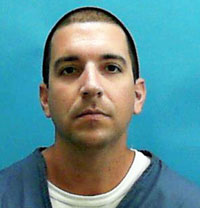
In a trio of decisions today, the Fifth District Court of Appeal let stand convictions of Shaun Whitt, who is serving a life term for raping an 11 year old, and Michael Stavris, who is serving 15 years on charges of felony child abuse, stalking and impersonating a child.
All three decisions were per curiam–one-line affirmations of lower court decisions, without explanations.
Stavris had been convicted in 2016 on three felony counts of child abuse and the fraudulent use of someone else’s identity after his 2014 arrest on charges of computer porn involving under-age individuals. He had impersonated his ex-girlfriend’s minor daughter through fake Facebook profiles, among other offenses. In court, his status as a police officer and persuasive arguments by his attorney, Aaron Delgado, playing in his favor, he pleaded to lesser charges of child abuse and impersonation, at that point avoiding a sex offender designation. He served less than three years in prison.
Stavris wasn’t out three months, and on probation, before he was re-arrested on similar charges in early 2019: fraudulently misusing the identity of the same girl, violating his probation, and stalking.
This time neither his probation officer nor Assistant State Attorney Melissa Clark were interested in leniency. Represented by a public defender, Stavris pleaded no contest, was required to serve the full five years on his previous convictions, then 10 years on a new conviction for impersonation–to be served consecutively, meaning that he could not use previous time in prison as credit for any part of the 10 additional years. He was also designated a sex offender. His current status in Florida prisons has his release date as 2033, though that could change with good behavior. But he’ll then have to serve sex-offender probation for an additional five years, when he will be prohibited from working where children congregate, have any unsupervised contact with children, or use the Internet in any way, among other conditions.

But she told a school counselor, handing over a note that stated: “My dad rapes me.” DNA evidence helped convict Whitt, with a jury deliberating just one hour.
Two family members spoke to the court before sentencing–his father and stepfather–saying they believed his innocence. “He’s got a 74 IQ,” his stepfather told the court. “He’s been slow all his life, and I just honestly don’t think he really can do all these things.” Circuit Judge J. David Walsh then sentenced Whitt to life without parole.
Three years later, in 2017, Whitt filed a motion for “post-conviction relief,” the legal terms for a defendant’s attempt to either abrogate or reduce a sentence. He claimed his attorney–Assistant Public Defender Regina Nunnally–was ineffective when she advised him not to take the stand, and when she failed to have a Department of Children and Families investigator testify to a “big lie.” Allegedly, the child victim had told the investigator that she had told “a big lie.”
Circuit Judge Terence Perkins, ruling on the motion just last year, found that the victim “was vigorously cross-examined regarding the ‘big lie’ and admitted she said that even though she could not remember what she lied about.” Perkins also rejected the claim that Nunnally had prevented Whitt from testifying, so much as she had advised against it–and he’d agreed at the time.
It was that decision by Perkins that Whitt appealed, and that the Fifth District upheld, in essence ending Whitt’s avenues of appeal. (Appeals to the Fifth District are almost automatic, appeals to the Supreme Court are more rare.)
The two decisions affirming Stavris’s 2016 and 2019 convictions were by the same three-judge panel of the 5th District: Judges Jay Cohen, F. Rand Wallis and Jamie Grosshans. Judges Richard Orfinger, Eric Eisnaugle and Dan Traver affirmed Whitt’s conviction.






























KbSays says
Good! Keep them where they belong so our children can be safe.